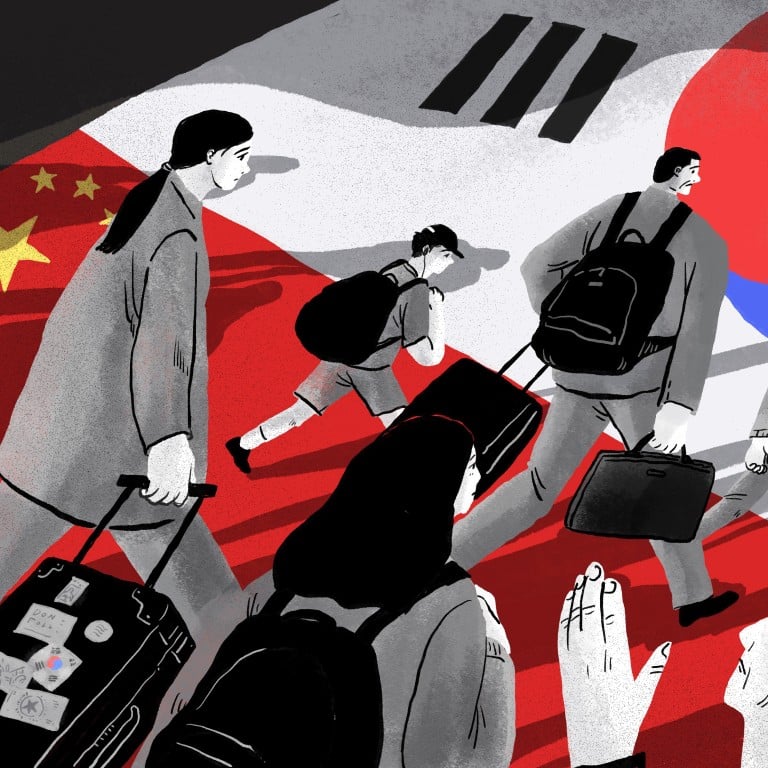
China’s Korean expats, students lament loss of jobs and opportunities as mass exodus comes into focus
- China was once seen as a land of opportunity for South Koreans, but as their businesses close and livelihoods come under threat, that perception has reversed
- However, not all Koreans can simply upend their entire lives – often built over several decades in China – and their struggle reflects a rising dilemma facing foreigners
For South Korean national Baek Hwi-jeong, China has not only been her home for nearly a quarter century, it’s also where she raised a family and became a seasoned businesswoman.
She moved to China in 1998 at age 30, accompanying her husband who had received a government scholarship to study at Peking University, along with their then one-year-old son.
Their move came amid the Asian financial crisis, and was just a few years after the 1992 normalisation of diplomatic relations between China and South Korea – a period that saw many South Koreans settle in China, forming large communities in major cities.
Baek saw this as an opportunity. In 2001, after her family had moved from Beijing to Shenzhen, she created a magazine business targeting the growing Korean expat population in the booming southern metropolis.
And her freely distributed Korean-language magazine, Kyomin Segye, found great success by featuring paid adverts for various Korean-owned businesses.
Hiring freezes, lay-offs, pay cuts: China’s small firms tighten purse strings
“In the first 10 years, there were around 100 to 150 advertisements in the weekly magazine,” she recalled. “At one point, the magazine was as thick as 2cm because of all the ads. Each month we would print around 40,000 copies.”
But while her business is still operating today, it’s a shell of its former self, and the glory days have clearly come to an end.
Two-and-a-half years of Covid-19, coupled with China’s strict lockdown policies, have essentially wiped out what had been the two pillars of Baek’s once-lucrative business model – the sizeable Korean community and Shenzhen’s vibrant Korean-owned-business scene.
“My business really bore the brunt of Covid-19,” Baek lamented. “We stopped printing physical copies after the number of Korean expatriates decreased significantly.
“Although we kept trying to print physical copies at the beginning of the pandemic, it gradually became clear that we couldn’t keep ‘eating our own flesh’,” she added, using a Korean idiom that basically means doing something detrimental to oneself in a desperate bid to survive. “It’s been a year since we ultimately stopped printing physical copies.”
I am pretending like we have not gone bust, when we actually have
Today, Baek’s magazine publishes online just twice a month online, and the number of adverts has plunged to about 20, forcing her to lay off a reporter and graphic designer.
“By publishing online, I’m barely making ends meet, and in no way am I making money like before. I am pretending like we have not gone bust, when we actually have,” she quipped.
Baek’s personal account perfectly illustrates the impact of what has been a mass outflow of Korean expats from China during the pandemic. While there are no official figures, the exodus has been witnessed on the ground in several Chinese cities, and anecdotal evidence abounds.
Furthermore, the leaving trend seems to have spilled over to the South Korean student community in China. However, the reasons behind the departures seem to differ between Korean expats and students.
‘Children aren’t a must’: population growing pains for China, South Korea
Many students, on the other hand, say that they are leaving because of the Chinese government’s policies, and that their “Korean values” and ways of life have become incompatible.
But whatever the reason, experts in Korea-China relations say the exoduses of both groups are worrying.
Mr Chung, a 49-year-old Korean national who has resided for more than 20 years in Yanji – which is the seat of the Yanbian Korean Autonomous Prefecture in China’s Jilin province – said the exodus is unmistakable.
“I feel like around 50 per cent of Koreans who used to live in Yanji have left throughout the pandemic,” said Chung, who ran a Chinese tutoring centre for foreigners from 2008 until September, when he was forced to shut it down due to lost business.
“The fact of the matter is the economy has been so bad. When there’s a citywide lockdown, you cannot work for around a month, which means no income.”
Yanji has been placed under a citywide lockdown three times since 2020, and there have also been more frequent district-level lockdowns.
In Dongguan, an industrial city in Guangdong province where a lot of Korean expats have operated factories, news of Korean businesses going bankrupt or companies relocating to other countries has become commonplace, according to Jeong Soo-jeong, 50, who has lived in Dongguan since 2008 and runs a tutoring business teaching Korean students how to code.
“I’ve heard from other Koreans who run factories in the city that every single day, during citywide lockdowns, there would be a couple of Korean-owned factories that went bankrupt,” Jeong said. “I also know that 10 Korean families will soon be relocating to Vietnam because the whole factory that the family works for is moving to Vietnam.”
Jeong also said that people are not leaving purely due to the fact that lockdowns are personally hard to endure.
“It’s more so due to how it affects their livelihoods. Take long quarantine periods, for instance. If I’m a businessman who has to go on international business trips, it’s obviously extremely inconvenient to be based in Dongguan right now.”
Stay or go? South Korean firms ask if it’s still worth operating in China
Park Chang-joo, a 60-year-old Korean national who has worked in the trade industry in Shanghai for 20 years, similarly said that he sees realistic financial concerns. But not everyone can simply leave China.
“Realistically speaking, I think there are more people who find it extremely difficult to completely uproot from China and move somewhere else,” Park said. “After the lockdown, I hear a lot of people jokingly say that they want to leave, but I haven’t really seen many people take that into action.
“I did think about returning to Korea, but I still believe there are more opportunities in China than in Korea.”
I think, for many of us coming from Korean cultural backgrounds, it is difficult to embrace [China’s] zero-Covid restrictions
The total saw a roughly 43 per cent plunge from about 47,000 in 2020 to nearly 27,000 in 2021, according to the Korean Ministry of Education. At the peak in 2017, there were more than 73,000 Korean students studying in China.
Representatives of the Korean student associations at Peking University and Zhejiang University both said that the gradual decrease in the number of freshmen throughout the pandemic was noticeable.
“There were around 300 Korean students in my batch when I started as a freshman in 2018. In 2020, there were around half of that. This further dwindled to around 100 in 2021,” said Yun Jung-bin, the association’s representative at Zhejiang University.
“I think, for many of us coming from Korean cultural backgrounds, it is difficult to embrace the zero-Covid restrictions.”
Furthermore, strict lockdown measures that became more common in the past year had led many students who were already enrolled in Chinese universities to return to Korea and take online classes.
Jang Seong-woo, a third-year student at Peking University studying international relations, is the representative of the school’s Korean student association.
“In the last semester, most Korean students in Peking University decided to go back to Korea once rumours started spreading in April of a lockdown in Beijing,” Jang said, adding that around 70-80 per cent of Peking’s Korean student population had left China.
Other South Korean students across China said coronavirus regulations have changed their plans to get a job in China after graduating. That includes Kim Yeon-su, a 24-year-old graduate student studying global business journalism at Tsinghua University.
“There are many students who are tired of the quarantine policies and documents required when entering the country, and many think that the quality of life in China is low,” Kim said, adding that they are now more inclined to seek work in Taiwan, Hong Kong or Singapore than stay in mainland China.
Like most of her friends, Kim returned to South Korea several months ago, opting to take online classes. When she graduates in June, she intends to look for a job in her homeland or elsewhere.
With an eye on China, South Korea looks to build ‘supply chain alliances’
Moving forward, some experts even say that such a heavy outflow of Korean expats and students from China may not bode well for bilateral relations between the two countries.
“In the end, both governments should make efforts for the healthy development of Korea-China relations. In particular, it is necessary to devise a plan to improve the Korean youth’s perception towards China, which has been rapidly deteriorating recently,” said Moon, who specialises in the Chinese economy and trade.
“Critical views towards the Chinese authorities’ ultra-hardline policies related to Covid-19 have also increased [among Koreans].”



